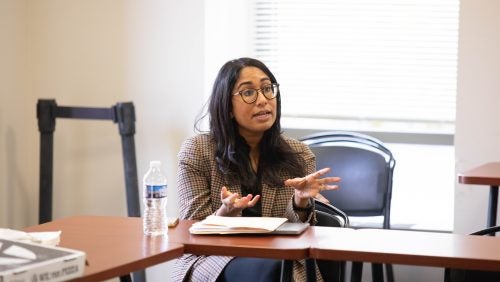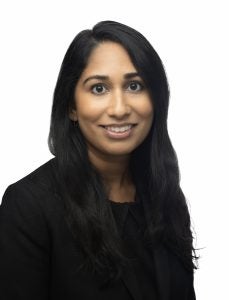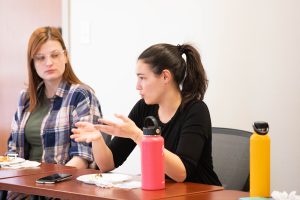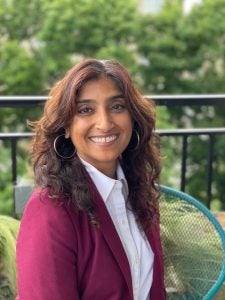Top Public Interest Lawyers Visit, Teach as Georgetown Law ‘Leaders-in-Residence’
December 19, 2023

Innocence Project attorney Yosha Gunasekera advised aspiring public interest lawyers at a lunchtime event.
Some days, Innocence Project attorney Yosha Gunasekera told an audience of aspiring public interest lawyers, she feels like a cold-case detective as she combs through transcripts, autopsy records, police reports and crime scene footage in search of evidence that could exonerate clients who have been wrongfully convicted.
“You’re looking for a needle in a haystack,” Gunasekera said during a fall visit to Georgetown University Law Center as part of the 2023 Blume Public Interest Leaders in Residence Program, which brings experienced public interest practitioners to campus to meet with and advise students interested in public interest law.
A former public defender, Gunasekera now leads an Innocence Project initiative that expedites exonerations through collaboration with the Queens, N.Y. district attorney’s office — but still recalls the challenges and fears she faced as a new graduate pursuing a public interest career.
“What law students don’t always appreciate is that you learn so much on the job,” she said. “You can’t expect to be perfect on day one.”
Overcoming adversity
This year’s leaders-in-residence included seven attorneys and advocates in practice areas ranging from reproductive rights to environmental law. Over the course of each three-day residency, leaders meet with students individually and in groups and teach an upper-level seminar for students in the Blume Public Interest Scholars Program.
“We are particularly interested in inviting visitors who can advise students of all backgrounds and experiences,” said Adrianne Clarke, senior associate director of the Office of Public Interest and Community Service (OPICS), which oversees the leaders-in-residence program. “We take a broad view of leadership to include styles and ways of leading that may look different from a person holding a particular job title or having a specific number of years of experience,” she noted, adding that students in the Blume Scholars program also provide feedback during the selection process.

Gunasekera urged students to think like defense attorneys about the factors that lead to wrongful convictions.
During her seminar, Gunasekera presented two successful Innocence Project exonerations and urged the class to think like defense attorneys about the cases — including the role that factors such as eyewitness misidentification, faulty forensic science and false confessions play in wrongful convictions.
Gunasekera later discussed her work and other career opportunities (including the Innocence Project’s fellowship program for new attorneys) at a lunch-and-learn event open to all students, where attendees asked about the benefits and drawbacks of a public interest career, from navigating attorney-client relationships to maintaining work-life balance.
“There’s going to be adversity at every turn,” Gunasekera said, acknowledging that public defenders face challenges like poor funding and high caseloads. But her advice to students was resolute: “Keep going, because the world needs you,” she said. “The legal field needs you.”
Public interest possibilities
Sarah Minion, L’26, attended Gunasekera’s lunch event and also met with her during a one-on-one visit arranged by OPICS. The individual meeting was a valuable opportunity to ask Gunasekera questions based on her own experiences in the field, said Minion, who worked in criminal legal system reform for several years prior to law school.
Minion attended a number of the program’s lunch-and-learns this semester, starting with September leader-in-residence Bradley Girard, L’14, LL.M.’20, the litigation counsel for Americans United for Separation of Church and State and a former clinical teaching fellow at Georgetown Law’s Appellate Courts Immersion Clinic.
Despite his practice area differing from her own interest in criminal justice reform, Minion found Girard’s visit illuminating. “The same values that I see myself working toward are at the heart of his work,” she said.

Students had the opportunity to ask Blume leaders-in-residence questions about pursuing public interest law.
For Caitlin Quinn, L’26, a Blume Scholar and evening student who works full-time as a program analyst at the Department of Housing and Urban Development, the leaders’ varied careers proved similarly inspiring — and reassuring.
“So many of the guests emphasized how uncertain they were about their own career paths in their second and even third year of law school,” said Quinn, who is still deciding which public interest practice area she’d like to pursue after graduation.
Quinn particularly enjoyed hearing from and meeting with leader-in-residence Tamica Daniel, M.P.P., L’09, a Department of Justice trial attorney who investigates and litigates fair housing, fair lending and public accommodations discrimination for the agency’s civil rights division.
“I’ve come to understand that many public service lawyers feel like generalists,” Quinn said. “They have wide-ranging interests.”
Building a ‘pipeline’ of lawyers
“Generalist” is exactly the word that ACLU Senior Staff Attorney Anjana Samant used to describe herself during her November residency. An experienced civil rights litigator, Samant’s current work for the ACLU Women’s Rights Project focuses on challenging racial and gender-based discrimination in the child welfare system.

ACLU Senior Staff Attorney Anjana Samant offered career advice about networking, mentorship and more.
Samant emphasized that lawyers and law professors have an important role to play in providing meaningful feedback, guidance and mentorship to law students interested in social justice and public interest careers. “Such work is necessary if we want a pipeline of amazing future lawyers to join our ranks and succeed us,” she said.
Samant similarly encouraged students to reach out to alumni networks, professors, clinic faculty and even other students to seek opportunities for career development and support. Her top advice for job-seekers? You could be qualified for a role even if you don’t meet every listed requirement — so don’t be afraid to apply.
Gunasekera echoed the importance of hands-on experience. “There are so many great opportunities, especially in Washington, D.C.” she said of activities like internships, clinics and the chance to shadow attorneys. “Rather than deter people, I find [those experiences] actually energize students to feel like they can do public interest work.”